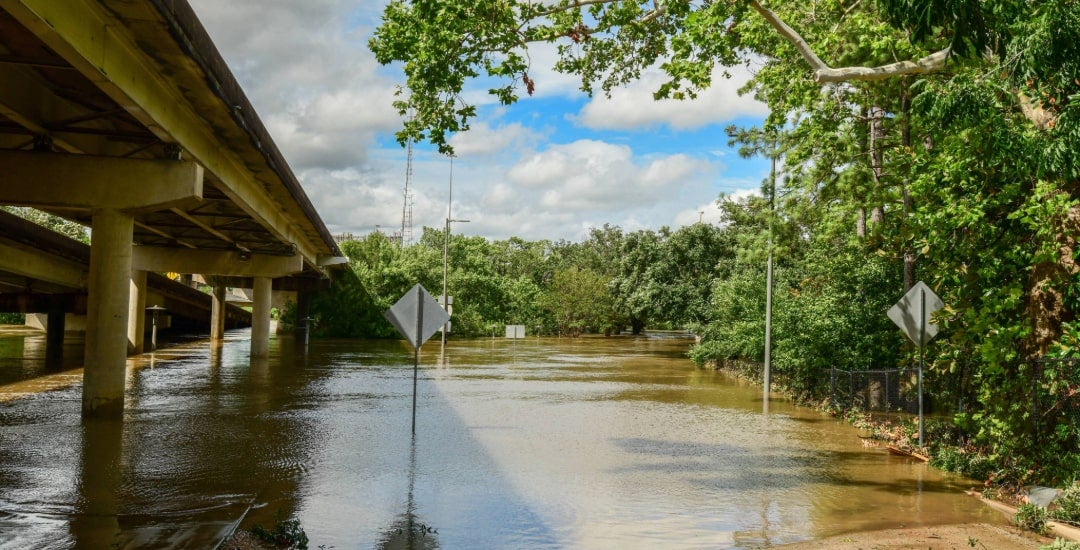In “Election 2023: Priorities and Concerns of Houston Residents,” a report by the Kinder Institute for Urban Research, the first priority for Houston’s 63rd mayor was to reduce crime, followed by improving physical infrastructure. Houston’s drainage system is set to receive more funding, but it could come at the expense of other critical services.
The Texas Supreme Court, by declining to review an appeal filed by the city of Houston of a ruling by the state’s 14th Court of Appeals on a 2019 lawsuit filed by two Houston engineers, ruled last month that $100 million must be allocated annually to a drainage fund. The fund was established by a city charter amendment passed by voters in 2010.
With the ruling, 11.8 cents out of every $100 of property tax revenue will be dedicated to the drainage fund, the original figure set by the charter. The city contributing less than that prompted the lawsuit.
“Houstonians are going to get more infrastructure, street repairs, more flood control out of this ruling. But it is going to put a larger strain on the city budget,” said John W. Diamond, the Edward A. and Hermena Hancock Kelly Senior Fellow in Public Finance at Rice University and the director of the Center for Public Finance at its Baker Institute for Public Policy.
The fiscal dilemma
While the will of voters is now being honored, City Controller Chris Hollins is concerned that he will not be able to certify the budget before the start of the new fiscal year on July 1, which could lead to delays and spending restrictions for city departments. The court ruling raised the city’s 2026 budget deficit from $220 million to over $320 million.
To partially offset the cost, Metro will commit $50 million from its General Mobility Fund, a one-time payment for next year’s budget. But a consistent source of the annual $100 million has yet to be identified.
Hollins said the city must find new sources of revenue, or it must make “painful cuts to essential services.”
“You’re looking at people, plain and simple,” Hollins said on Inside Texas Politics. “The challenges that we’re having are in our general fund, most of which is our police, our firefighters. So, you have a very small pie from which to cut if you don’t want to go into public safety, where you’re looking at hundreds and potentially thousands of jobs as the only way of solving this, unless you look at the revenue side.”
When asked by Houston Public Media if the city has options to generate more revenue, Hollins said yes — but they would be inconvenient for Houstonians.
“One of those is a potential tax increase,” Hollins said. “A garbage fee has been discussed a couple times over the last few years. Another one might be leveraging the water utility and somehow pulling revenue from there in ways other cities across Texas have done.”
Diamond said he believes a tax increase, especially on property taxes, would be unwelcome.
“Taxpayers are pretty tapped out,” Diamond said. “That’s the feeling I get from what I hear from the taxpaying public. They’re not really excited about a property tax increase. The mayor has said he’s not going to go down the property tax route until he’s shored up the efficiency, and cut government back to what he sees as an efficient level.”
Houston’s financial turmoil was the focus of a recently released citywide efficiency study. The report, “A Path to Restoring Trust in Houston’s Government,” was prepared by Ernst & Young. The report includes recommendations for the city’s performance and accountability, operations and efficiency, spending and procurement, and financial controls and risks.
“The city is struggling to find a way to pay all of its bills, but a lot of that is mismanagement of resources,” Diamond said. “That’s really what part of the Ernst & Young study shows. There has to be some restraint in terms of spending. The budget has to be whittled down, and it has to be more efficient.”
Residents open to chipping in more
According to another Kinder Institute study, “Election 2023: Overview of Residents’ Policy Preferences,” over 80% of Houston residents said they were willing to pay a higher drainage fee each month to increase the amount of money going to improve and repair water drainage systems and roadways.
The current fee amounts to about $5 a month for most homeowners. Sixty-eight percent of residents said they supported an increase of at least $5 a month for street repair and drainage infrastructure.
“Most city of Houston residents were not satisfied with the current condition of various city services and products, and were OK with the idea that for them to get better might involve paying more,” said Dan Potter, director of the Kinder Institute’s Houston Population Research Center.
Potter added that these revelations could reinforce the belief among residents that they are already paying more than enough in taxes, and that money is not being spent as wisely or efficiently as it could be.
“Public trust is so important whenever residents are asked to pay more, even if it is intended to improve something,” Potter said. “Nurturing and growing trust through governmental transparency, efficiency and action will be important if the city is to continue to benefit from additional revenue streams that bring in much-needed money for projects aimed at building a better, more resilient Houston.”
Quality services key to city’s future
Diamond pointed to Houston’s relatively flat population growth over the last decade as one of its biggest problems. He said this is driven by a combination of two factors: the services the city provides to residents and the cost of those services.
“It has to be an attractive package,” Diamond said. “If The Woodlands offers much better service, or the same level of service at a cheaper cost, they’re going to get some of your citizens.”
While Diamond expects Houston’s budget deficit to grow, he said guaranteed funds toward infrastructure are ultimately a positive development.
“Infrastructure is critical,” Diamond said. “If you don’t provide for investment in infrastructure, you hollow out the city, and people won’t want to live there. The problem can’t be solved by not spending on infrastructure.”




